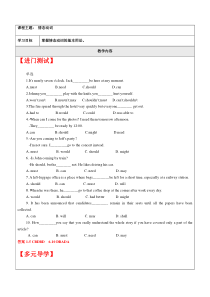 DOC
DOC
【文档说明】第二章第8讲-情态动词-教案.docx,共(14)页,174.352 KB,由管理员店铺上传
转载请保留链接:https://www.doc5u.com/view-65405baf272aea8868b8121e2912fd61.html
以下为本文档部分文字说明:
课程主题:情态动词学习目标掌握情态动词的基本用法。教学内容【进门测试】单选1.It'snearlyseveno'clock.Jack_________behereatanymoment.A.mustB.needC.shouldD.can2.Jo
hnny,you_________playwiththeknife,you________hurtyourself.A.won't;can'tB.mustn't;mayC.shouldn't;mustD.
can't;shouldn't3.Thefirespreadthroughthehotelveryquicklybuteveryone________getout.A.hadtoB.wouldC.couldD.wasableto4.-WhencanIcomefortheph
otos?Ineedthemtomorrowafternoon.-They_________bereadyby12:00.A.canB.shouldC.mightD.need5.-AreyoucomingtoJeff'sparty?-I'mnotsure.I_________gototheconc
ertinstead.A.mustB.wouldC.shouldD.might6.-IsJohncomingbytrain?-Heshould,buthe________not.Helikesdrivinghiscar
.A.mustB.canC.needD.may7.Aleft-luggageofficeisaplacewherebags_________beleftforashorttime,especiallyatarailwaystation.A.shouldB.canC.must
D.will8.Whenhewasthere,he________gotothatcoffeeshopatthecornerafterworkeveryday.A.wouldB.shouldC.hadbetterD.might9.It
hasbeenannouncedthatcandidates_________remainintheirseatsuntilallthepapershavebeencollected.A.canB.willC.mayD.shall10.How_________yous
aythatyoureallyunderstandthewholestoryifyouhavecoveredonlyapartofthearticle?A.canB.mustC.needD.may答案1-5CBDBD6-10D
BADA【多元导学】批注:让学生阅读并试着翻译图片中的情态动词,找出其中的情态动词,注意观察并举例说说不同用法。【互动精讲】知识点一情态动词的基本含义和用法【知识梳理1】情态动词的基本含义和特征情态动词是一种本身有一定的词义,表示说话
人的情绪,态度或语气的动词,但不能单独作谓语,只能和其他动词的原形构成谓语。情态动词数量不多,但用途广泛,主要有下列:can(could),may(might),must,need,shall(should),will(would)。情态动词的特征1、有一定的词义
,但不能单独做谓语,必须和行为动词和系动词连用构成谓语。2、无人称和数的变化(haveto例外,如在一般现在时态下用于第三人称单数时用hasto)。3、后接动词原形,即不带to的不定式。4、具有助动词的作用,可用来构成否定句、疑问句及
用于简单答语。【例题精讲】1.我们必须待在这儿。Wemuststayhere.2.他必须待在这儿。__________________________Keys:Hemuststayhere.3.我们不得不步行回家。Wehavetowalkhome.4.他不
得不步行回家。___________________________Keys:Hehastowalkhome.5.她也许迷路了。___________________________Keys:Shemaylosehe
rway.【知识梳理2】can和could1、can表示能力例:①IcanspeakalittleJapanese.(我会说一点儿日语。)②Shecouldn’tspeakChinesewhenshecametoours
choollastmonth.(上月她来我校时还不会说中文。)2、can表示允许,准许,这时can与may可以互换例:①---Can/MayIborrowyourbiketomorrow?明天我可以借你的自行车吗?---Yes,ofcourse.Youcan/may
usemybiketomorrow.当然可以。明天你可以用我的自行车。②Youcan’tsmokehere.你不可以在这儿抽烟。3、can表示客观可能性,用在否定句和疑问句中表示猜测。例:①Hecannot/can’tbethere.他不可能
在那儿。②Canthisnewsbetrue?这消息可能真实吗?4、could是can的过去式,在口语中经常代替can,表示非常委婉的请求。这时could和can没有时间上的差别。例:①Could/Canyoute
llmeifhewillgotomorrow?你能告诉我他明天是否去吗?②Could/CanIaskyousomethingifyouarenotbusy?如果您不太忙,我能否问您一些事情?③Could/Canyoushowmeth
ewaytothenearesthospital?您能给我指一下去最近的医院的路吗?【例题精讲】例1:---ItmustbeJohnwhoisintheoffice.---I’msureit______b
eJohn.Isawhimoffattherailwaystationjusttwentyminutesago.A.won’tB.mustn’tC.can’tD.needn’t答案:C解析:本题考查的是情态动词can表推测的用法。前面一句说“在办公室里的人肯定是约翰。”后面一句话说“我二十分钟
前刚在火车站送走他。”因而说明在办公室里的人不可能是约翰。考查must表示肯定时的否定,是can’t.例2:---______youswim?---Yes,butI’mnotagoodswimmer.A.CanB.MayC.NeedD.Must答案:A解析:
本道题考查can表示能力时的用法。后面答句的句意是“是的,但是我不擅长游泳。”说明他会游泳。所以选择C。【知识梳理3】may和might1、may表示“准许”和“许可”,这时可与can替换。例:①--May(Can)Iuseyourdictionaryforamoment?我可
以借你的字典用一下吗?--Yes,youcan.好的。②---MayItakethesemagazinesoutofthereadingroom?我可以把这些杂志带出阅览室吗?---No,youmustn’t.
不,不行。例1:--MayIgonow?我可以走了吗?--No,youmustn’t.不,不可以。例2:--MayIsmokehere?我可以在这儿抽烟吗?--Yes,youmay./Yes,youcan.请抽吧。--No
,youcan't./No,youmustn't./No,you'dbetternot.请不要抽烟。2、may表示说话人的猜测,认为某事“可能”发生,常用于肯定句。例如:例:---Where’sJohn?约翰在哪儿?---Hemaybeatthelibrary.他可能在图书馆。3、mi
ght除表示may的过去式外,在口语中还常代替may,表示非常委婉的请示或实现的可能性较小。这时might和may没有时间上的差异。例:①Might(May)Ispeaktoyouforafewminutes?我
现在可以与你谈几分钟话吗?②MightIhaveaphotoofyourfamily?我可以要一张你们的合家照吗?【例题精讲】例1:—Doyouhaveanyplansforthisweekend?—I'mnotsure.I______goc
limbingMountYuntai.A.mustB.needC.mayD.can解析:答案C。考查情态动词表示推测的用法。A表示“必须”,B表示“需要”,C和D都表示“可能”,但是因为前面“I’mnotsure”,表示很不确定,
所以用may。例2:—Whereareyougoingthismonth?—We______gotoXiamen,butwe’renotsure.A.needn’tB.mustC.mightD.mustn’t解析:答案C。考查情态动词表推测。A“不必”表建议;B“一定”表猜测
的可能性很大;C“可能,也许”表不是很肯定的猜测。D“不允许”表命令。句意:——这个月你们将去哪?——我们或许去厦门,但还不确定。故选C符合语境。批注:老师可以告诉学生一般情况下,看到benotsure,就可判断
用may或might。【知识梳理4】must和haveto1、must表示说话人的主观意志,表示义务、命令或必要、应当和必须等。现在式与过去式同形。否定句中用mustn’t表示禁止。例:①Imustgotoschooltoday.今天我必须上学去。②Hetol
dmeImustn’tleaveuntilmymothercame.他告诉我,在我母亲回来之前我不许离开。2、must表示推测,“一定是”、“准是”,一般用于肯定句。在疑问句和否定句中一般用can,否定句中can’t表示“不可能”。例:①Theymustbeverytir
ed.Letthemhavearest.他们一定是非常疲劳了。让他们休息一会儿吧。②Jackdoesn’tlookwell.Hemustbeill.杰克看上去气色不太好。他一定是病了。③Thatcan’tbetheonlywaytosolv
etheproblem.那不可能是解决问题的唯一办法。④Jane’slightison.Shemustbeathome.Shecan’tbeout.简的房间里开着灯。她一定在家,不会出去的。3、以must开头的疑问句,肯定回答用must;否定回答则常用
needn’t,意为“不需要,不必”,相当于don’thaveto.例:---MustIfinishtheworktoday?---Yes,youmust./No,youneedn’t(don’thaveto).4、must和haveto意思都是“必须”,常可以互换使用
。但haveto用于强调客观需要,意为“必须,不得不”;must用于表示主观意愿,意为“必须”。例:①We’llhavetoaskZhangHonginstead.我们必须去请张红代替了。②Wemustworkhardatsc
hool.我们在学校必须努力学习。【例题精讲】例1:—Whoseisthepencilbox?—It_______beTom's.Lookathisnameonthecover!A.canB.mayC.mustD.need解析:答案C。
根据最后一句的句意“看他的名字在封面上”,可知前面表示很肯定的猜测,所以用must。例2:—_______Iturndowntheradionow?—No,you.A.Must;mustn’tB.Must;needn’tC.Need;can’tD.Ne
ed;won’t解析:答案B。考查情态动词的用法。上句句意“我现在一定要把收音机声音调小吗?”,下句句意“不,你没有必要”。由此可知第一空填写“must”,表示“必须”;第二空填must表示“必须”时的否定
“needn’t”或“don’t/doesn’thaveto”。【知识梳理5】needneed作情态动词时,一般用于否定句或疑问句,无形态变化。例:①Youneedn'tdoitagain.你不需要再做了。②Heneedn'tworryaboutit.
这件事他无需担心。③Needhedothishomeworkfirst?他需要先做这些作业吗?④Needtheyfillintheform?他们需要填表吗?【例题精讲】例1:There’senoughtim
eforyoutogototheairport.You______hurrynow.A.shouldB.needn'tC.mustD.can't解析:答案B。考查情态动词的用法。句意是“你去机场还有足够的时间,不需要那么匆忙”,所以用needn’t。例2:—It’ssaidth
atyouhavemovedintoanewhouse.—Yeah,andwe_______tobuysomefurnitureinthemallnearby.A.canB.shouldC.needD.may解析:答案C。这里考察的是need的实义动词的用法needtodosth
.。【知识梳理6】should(shall)/hadbetter1、should作情态动词,表示“应该”、“应当”的意思。2、shall用于第一人称,表示征求意见、询问,用于第二、三人称时,表示警告、命令、允诺等。3、hadbetter意为“最好.
.....”,后接动词原形,否定形式在后面直接加not,再接动词原形。【例题精讲】①Youshouldrespectyourteachers.你们应该尊敬你们的老师。②Weshouldbecarefulofothers’feelings.我们应该尊重别人的感情。③Sha
llwestartthemeetingatonce?我们立即开会好吗?④It’slate.You’dbettergoandlookforhim.太迟了。你最好去找他。⑤You’dbetternotreadbook
sinpoorlight.你最好不要在微弱的灯光下看书。批注:老师可以通过让学生举例来补充一些提建议的句型。【知识梳理7】will和would1、will用于第二人称表示询问、请求,也可以表达现在的“意愿”。
2、would用来表示过去的意愿或委婉的询问。【例题精讲】例:①Willyougetmesomechalk?你拿些粉笔给我好吗?②Wouldyoulikesomebananas?来点香蕉好吗?知识点二情态动词之间的区分【知识梳理1
】表示能够can和beableto的区别表示能力时用法相同,can只用于一般现在时和一般过去时(could),其他时态要用beableto。另外,表示过去某一特定情况下成功做到某事时,用beableto。【例题精讲】例:①Jimc
ouldn’tspeakEnglishChineselastyear,butnowhecan.②Wewillbeabletocomebacknextweek.③Finishyourhomeworkfirst,thenyou’ll_______watc
hTVforanhour.A.canB.beabletoC.ableDcould解析:答案B。will是助动词,其后应该用动词的原形,而can是情态动词,故不能与will连用,所以选B。【知识梳理2】表示推测can、may和must的区别(1)在肯定句中,常用may表示可能(2)在
否定句中,若语气肯定,表示“不可能”时用can’t,若语气不肯定,表示“可能不”,则用maynot。(3)must表示非常肯定的推测,语气较强;其否定为can’t。【例题精讲】例1:---Thereissomebodykno
ckingatthedoor.Who________itbe?---I’mnotsure.It________beapostman.A.may;mustB.will;canC.can;mayD.may;will解析:答案C。这个可以
根据下句判断,下句中的“I’mnotsure”是个较明显的提示,需用may表示猜测语气非常不确定。例2:—Who’sthemanoverthere?IsitMr.Black?—It______behim.He’smuchtaller.A.maynotB.can’t
C.willnotD.mustn’t解析:答案B。考查情态动用法。句意:那边那个人是谁?是布莱克先生吗?一定不是他,他高多了。情态动词表推测:“一定”用must,“可能”用might、may、could;“一定不”用can’t。故选B。例3:It’sthelibrary!Soyou__
______knowshoutingisnotallowedhere.A.canB.mustC.needD.may解析:答案B。根据句意“这里是图书馆,所以你肯定知道这里不允许大声吵”,表示语气很肯定的猜测,用mu
st。例4:—Isn’tthatMary’snewEnglishteacheroverthere?—No,it_______beher.I’msureshedoesn’thavelonghair.A.wo
n’tB.can’tC.mustn’tD.needn’t解析:答案B。这里表示对上句的推测“那不可能是她,因为我确定她没有长发”,表示“不可能”用can’t。例5:Hownicethefoodsmells!I’msureittastedelicious.A.mustB.canC.mayD.s
hould解析:答案A。“I’msure”后接很肯定的猜测,用must。例6:―Mr.Smithmusthavebeentoyourhomethismorning.―No,he,becausehedi
dn’tknowmyaddress.A.couldn’tB.can’tC.mustn’tD.maynot解析:答案A。根据下句后半句“他不知道我的地址”可知前面是说“他不可能去我家”,用can’t,但本题中要注意musthavedone结构是对过去事实的推
测。因此只有A选项是过去时。【知识梳理3】表示委婉语气could,would和might这几个词有时并不表示过去式,而是表示委婉客气的语气。【例题精讲】例1:——________youmindspeakingmoreslowly?Icanhar
dlyhearyou.——Ofcoursenot.A.WouldB.WillC.MayD.Might解析:答案A。这里并不是过去式,而是更委婉地表达想法。例2:YourT-shirtissocool._________youte
llmewhereyouboughtit?A.WouldB.CouldC.ShouldD.Must解析:答案B。句意为“你能否告诉我你在哪买的”,这里表示询问,语气要很客气,所以用“could”。【知识梳理4】表示许可can和may以及回答表示许可的时候,两者常可以
互换。【例题精讲】例1:—________Iswimhere?[来源:中国教育^%#出版&网@]—I’msorry.Children__________swimalonehere.[来源:@~中&^教*网]A.Must;can't
B.May;mustC.Can;mustn'tD.Can't;can解析:答案C。上句是询问“可不可以在这里游泳”,用can或may都可以,但下句句意是“孩子禁止单独在这里游泳”,用mustn’t。例2:翻译句子①--妈妈,我可以出去踢足球
吗?(may)--可以。②--我可以和你一起去看电影吗?(may)--不,不可以。解析:答案①--Mum,mayIgoouttoplayfootball?--Yes,youmay/can.②--MayIgotothecinemawithy
ou?--No,youcan’t/hadbetternot.【知识梳理5】maybe和maybe的区别前者为副词,表示“大概、也许”,相当于perhaps,常用于句首。后者是情态动词may,后加上动词原形be,常用在句中。【例题精讲】例1:—IsJimcomingbytrain?
—I’mnotsure.He________inhiscar.A.maybeB.maybeC.mayD.can解析:答案B。句意“他可能是开车的”,这里需要一个谓语动词,只有B。例2:用maybe和maybe填空①—CanTinaplaytheviolin?蒂娜会拉小提琴吗
?—_________.可能会吧。②You_____________right.你也许是对的。解析:答案①Maybe②maybe。①句表示“大概、可能、也许”,②因为句中缺少一个谓语动词,maybe表示“可
能是,也许是”,符合题意。【课堂练习】1.InBritain,cars_______keeptotheleftaccordingtothetrafficrules.(2017高淳二模)A.mustB.mayC.canD.need2.—Manyp
eoplepreferspendingmuchtimeonsmartphonestoreadingtoday.—That’stoobad.Everyonebeabooklover.Readingbringsmuchpleasure.(2017联合体二模)A.woul
dB.mayC.mustDshould3.—It’sverykindofLilytoprepareallthethingsfortheparty.—Doyoumeanwe______bringanything?(2017秦淮二模)A.can’tB.s
houldn’tC.needn’tD.mustn’t4.—Dad,mayIgoouttoplaybasketballwithJames?—Ifyou_______,comebackbeforelunch.(2017江宁二模
)A.mustB.mayC.mightD.should5.—Robert,I’mafraidI_______finishtheworktoday.—Itdoesn’tmatter,youmayfinis
hittomorrow.(2017建邺二模)A.needn’tB.can’tC.mustn’tD.shouldn’t6.---Kate,it’smidnight!Whystayupsolate?---I’dliketogotob
edearlier,butthetestpaper______behandedintomorrowmorning.(2017鼓楼区一模)A.mayB.shouldC.canD.must7.----Hownicethebuildingis!Whatisitfor?-
---It__________ahotel.ButIamnotsure.(2017溧水区一模)A.mustbeB.havetobeC.maybeD.can8.---Whowillgiveusthespeechonpublicmanners?---Mr.Bro
wn_________,butI’mnotsure.(2017江宁区一模)A.canB.needC.mustD.might9.---Ihearthatyou’vegotplentyofforeigncoins.Ihavealook?---Sure.Letmeshowy
ou.(2017建邺区一模)A.ShouldB.NeedC.MustD.May10.---Whoissinginginthenextroom?IsitLucy?---No,itbeher.ShehasgonetoHainanonholiday.(
2017联合体一模)A.can’tB.mustn’tC.maynotD.needn’t答案1-5ADCAB6-10DCDDA【课堂检测】检测题(一):单项选择()1.—Igetthereontimetoday?—No,youneedn’t.A.CanB.MayC.MustD.
Should()2.Ateacherdoeveryexercise,butapupilmust.A.mayn’tB.needn’tC.can’tD.mustn’t()3.—Mustwefinishcopyingallthesearticlesthismorning?—No,you.A.
mustn’tB.haven’tC.nothavetoD.don’thaveto()4.Ihaveawordwiththeteacher,sir?A.WillB.WouldC.MayD.Should()5.Hefinishhishomeworkontime.A.ne
ednottoB.doesn’tneedC.needstoD.needs()6.Neitherhenorhischildrenabletoplaytabletennis.A.canbeB.couldC.isD.are()7.Welaughatothers.A.sho
uldn’tB.maynotC.needn’tD.can’t()8.—MayIgonow?—No,you.Youstayhere.A.needn’t;havetoB.needn’t;mustC.mustn’t;havetoD.mustn’t;hasto()9.“Wh
atIdoforyou?”means“Ihelpyou?”A.can;MustB.shall;NeedC.can;CanD.will;Shall()10.IliketogotothecinemawithmotheronSaturdayevening.A.willB.shallC.w
ouldD.can答案:1-5CBDCC6-10DACCC检测题(二):用can,may,must,need,haveto,hadbetter的适当形式填空:1.You________________returnthelibrarybookontime.2.I_________
_____(not)findthewaytothehospital._______________youshowmetheway?3.—________________Ifinishtheworkrightnow?—No,you________________(not).You___
_________doitlater.4.Hesaidhe________________(not)cometonight.5.Hermotherwasill.She________________stayathomeandlookafterher.6
.It’stimeforclass.You________________stopplayingfootballoryou__________belateforclass.7.We________________startrightnow,ortheywouldgettherefirst.8.Th
ecloudislifting,soit________________(not)bearainydaytomorrow.答案:1.must2.can’t,Could3.Must,needn’t,may4.couldn’t/mightnot5.hadto6.must,may/must7
.hadbetter8.can’t检测题(三):选择合适的词或词组填空1.Ihaveaheadache.I__________takeanaspirin.(hadbetter;wouldbetter)2.Helo
okssleepy.He________havegonebedverylatelastnight.(must;should)3.Iwanttogototheoffice,butyou__________withme.(neednottogo;neednotgo)4.I________
_havetakenthosebookstothelibrarylastweek.(oughtto;must)5.Themotheristellingherson,“You__________eatwithyourfingers!”(would
n’t;mustn’t)6.Hewasagoodswimmersohe_______swimtotheriverbankwhentheboatsank.(wasableto;could)7.TotravelfromEnglandtoScotlandyou__________apasspo
rt.(don’tneed;needn’t)8.Hewentonfoot,buthe__________bybus.(oughthavegone;shouldhavegone)9.A:DidKentakethejobinthebookstore?B:
No,butIthinkhe__________.(musthave;shouldhave)10.He__________talkforhours,ifyoulethim.(can;will)11.You__________usethistoothbr
ush,it’smine.(maynot;shallnot)12.Nomatterwhatpeoplesay,I__________doasIlike.(shall;will)13.“I’mwillingt
oletyoutakewhateveryoulike.”Means“you______takewhateveryoulike.”(shall;will)14.A:Ihaven’tfeltwellforaweek.B:You__________seeadoctor.(hadbe
tter;shouldhaveto)15.A:Heislate.__________hehavemissedthebus?B:Yes,hemusthavemissedthebus.(Can;Must)1.答案hadbet
ter。表示建议“你最好吃一片阿司匹林”。2.答案must。这里根据前句“你看起来很困”,很肯定的猜测“昨晚睡的很晚”,所以用must。3.答案neednotgo。need作为情态动词时,否定直接在后
面接not,若是实义动词,否定需在前面加don’t/doesn’t/didn’t。4.答案oughtto。这里表示一种义务和责任,“应该上周把这些书带到图书馆”,所以用oughtto。5.答案mustn’t。这里表示妈妈很严厉的话语“你禁止用手吃饭”。6.答案w
asableto。这里从意思上两个选项都可以,但这里更表示在沉船的情况下成功游到河岸上,所以用beableto。7.答案don’tneed。这里需要一个实义动词表示“不需要”,所以用实义动词need的否定形式。8.答案shouldhavegone。这两个选项
很好判断,因为ought后面需接to,再接动词原形,而should后直接接动词原形。9.答案shouldhave。这里只是表示一种建议“应该接受这份工作”,而不能强制性的要求“必须接受”。10.答案wil
l。这里表示意愿,“如果你让他讲,他会讲数小时”。11.答案shallnot。这里根据后句句意“那把牙刷是我的”,所以“你不应该用”。12.答案will。句意“不管别人说什么,我都会按自己喜欢的去做”,这是表达现在的一种意愿,用will
。13.答案shall。前句是一个承诺,后句要表达同样的意思,在用于第二、三人称时,shall可表示允诺。14.答案hadbetter。这里是一种关心的建议,语气较柔和。“你最好去看下医生”。15.答案Can。这里
是可能的猜测,语气并不强烈。【要点回顾】1.主要情态动词的基本含义和用法(无人称和数的变化haveto例外,如在一般现在时态下用于第三人称单数时用hasto。后接动词原形,即不带to的不定式。)2.情态动词之间
的区分(如can和beableto的用法;表示推测的canmayshouldmust的区分)【温故知新】一、用适当的情态动词填空1.You_______________(not)returnthebooktomenow.Youcankeepittillnextweekifyoulikeit.
2.Acomputer___________(not)thinkforitself.Itmustbetoldwhattodo.3.You______________(not)throwthepaperabout.Youshouldkeeptheroomcleanandtid
y.4.I_____________goclimbingwiththem,butI’mnotsureyet.5.Lotsofpeoplewenttoseethefilm,soIthinkit__________beveryinte
resting.6.---MustIfinishreadingthebookinaweek?---No,you___________.7._________wegoswimmingintheriverthis
afternoon?8.Mr.Smith_________(not)beinhisbedroom,he_________beinhisoffice.Becausehephonedmejustnow.9.I’ll_________lookaftertheboybecauseheistooyoung
.10.Heissostrongthathe_________lifttheboxeasily.答案:1.needn’t2.can’t3.mustn’t4.may5.must6.needn’t/don’thaveto7.Shall8.can’t;must9.haveto10.can
二、单选()1.—Mum.mustIgoshoppingwithyou?—No,you.YoucanwatchthefilmBigHero6withyourfriends.A.needn'tB.can'tC.shouldn'tD.mustn't()2.—Ikn
owbywhattimeyouwanttheprojecttobedone?—Bythedayaftertomorrow.youfinishitontime?A.May;CanB.Must;NeedC.Could;MustD.Need;Would()3
.—MustIfinishallthehomeworkthisevening?—No,you.TomorrowisSaturday,andyouhaveenoughtimeforit.A.mustn'tB.needn'tC.won'tD.can't答案:AAB
预习思考动词的种类有哪些?常考的动词及动词短语有哪些?获得更多资源请扫码加入享学资源网微信公众号www.xiangxue100.com